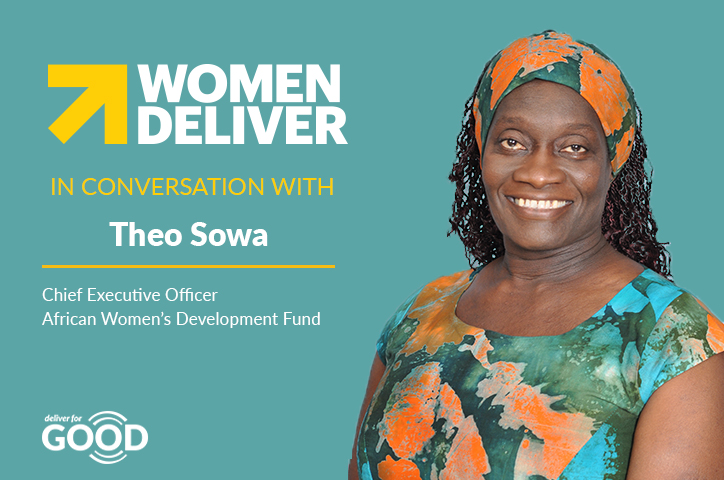Theo Sowa shares her thoughts with ‘Deliver for Good’ on Advocacy, Narrative and Her Sheroes!

Deliver for Good is an incredible global campaign, initiated by Women Deliver and its partners. It is an evidence-based advocacy campaign that applies a gender lens to the sustainable Development Goals, pushing actors to enhance policy programing and investment in girls and women. As part of this campaign,Theo Sowa, CEO of AWDF, spoke with Deliver for good in a brief interview. She shares her thoughts about who she considers her Sheroes and how the African woman’s narrative and reality can be a game-changer.
Here’s an excerpt from the interview:
WD: You have been listed as a leading African feminist helping to inspire the next generation of women leaders across Africa – and truly all around the world. Who are your sheros and how did they inspire you to become such a key voice for gender equality? Given this month’s editorial focus, if you have any education specific examples, please share!
TS: I have so many sheroes! Too many to list. For today though, I’d mention my mother and grandmother, who believed in the power of a good education, made sure that all the children in our family had that opportunity – but also made sure that we understood and appreciated the full potential, diversity and power of women – and the importance of listening, learning from and respecting all people. I’d mention Graca Machel, who pushed me to use my voice rather than staying in my comfort zone of helping other people to use their voices and show the world their own versions and visions of leadership. She taught me the importance of women recognizing and using our power constructively, and not colluding with those who would strip us of our power or tell us that to be visionary, powerful and amazing changemakers is somehow not feminine or not African. I would mention the fantastic women and girls that I met over the years in refugee and displaced persons camps in Liberia, Sierra Leone and Uganda (amongst other places) who had been through such horror, but showed every day that they were not victims but survivors and pushed to change the injustices in our world so that other women and girls did not go through the horrors that they had experienced. I’d mention the girls, adolescents, women and grandmothers who have taught me about resilience and solidarity – and all my sheroes who have taught me that rights and justice without love does not make a feminist revolution.
For the full interview, please click this LINK.
